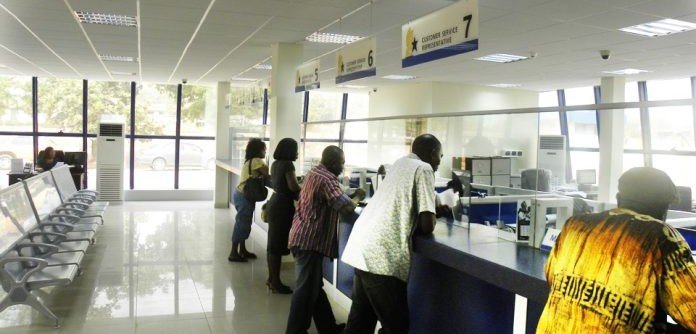
This week, the Bank of Ghana, the country's central bank had to order 5 local banks to fold and reconstitute as a single new bank- the Consolidated Bank of Ghana. These banks folded up close on the heels of two other banks folding up earlier in the year.
The worrying trend is all 7 banks are domestic founded and funded banks. They were primarily set up and controlled by Ghanaians. Indeed, this year has been a terrible one for finance services in Ghana.
A few weeks ago, a woman was brutally beaten by a policeman stationed at a banking hall of a savings and loans company. She had tried all week to withdraw all her savings of about US $52. The savings and loans company couldn't allow her withdrawal after she had waited each work day for a week. The management finally ordered the policeman guarding their facility to drive her out of the premise at the end of the fifth work day because their operating network had been inoperational all week.
She refused to leave without her money and was soundly beaten by the policeman even though she was cradling an infant in her arms.
The ensuing outrage was not only deafening but righteous. But the underlying problems have been ignored for a long time.
Why would she refuse to leave without her money if she could trust the financial institution?
Why did the Savings and Loans company not have her money?
Ghanaians have a long history with financial institutions often fronted by Ghanaians bursting unto the scene, promising and for a time delivering extremely lucrative services and profits and then abruptly leaving the business with the deposits of thousands of people worth millions of dollars.
A major understanding seeping in year on year is that doing business with a domestic bank is as risky as Russian roulette.
More business people are increasingly sticking to major international banking brands.
This of course, dents confidence in the surviving local banks but it also permits major capital repatriation and outflows from an economy which could really do with all that fleeing cash.
But these are but minor concerns for many Ghanaians.
The actions and inactions of the Bank of Ghana and the government are major causes for deep concern.
The central bank issued new regulations requiring banks have sufficient capital to operate. The Bank of Ghana was to verify each bank had a minimum of GhC 400 m before issuing licenses at the end of a grace period.
The international banks easily got the capital.
The local banks immediately went into stress mode. Some banks literally borrowed money from other banks to prove they are well funded to operate. Others simply falsified papers and others used non existent illiquid funds to prove their capitalisation.
This is not the major reason why any of those banks even collapsed. All the collapsed banks were running on hot air. They were insolvent or in deep debt. All sorts of corruption and financial malfeasance took place in these 7 banks. Shareholders took out so many loans from some of the banks without paying back till the banks were essentially run down.
Other banks simply doled out too many loans and their bad debt portfolio rose to as much as over 72% of their capital.
Others were operating with false licenses obtained using false documents and pretension.
After the financial crash of 2008, Wall Street began to feel the heat for it's active participation in bringing on the crash.
After the collapse of these banks in Ghana, the finance sector in Ghana is getting some tough flak.
However, the major difference is, some (too few in this writer's opinion) of the executives of Wall Street in the 2008 crash have been found, investigated and even punished for their part in nurturing the crisis.
In Ghana, not a single executive of any of those seven banks has been formally charged with any crime. They all walk free. Some have moved on to new roles with other banks while others go on with their business.
This is rather heart wrenching considering the many thousands of staff who lost their jobs and are yet to receive any severance package, the burden on taxpayers since, the Central Bank in the collapse of the first two banks approved and coordinated their take over- debt and all, by a state owned bank and in the case of the latest collapse of the five banks, a reconstitution and recapitalization into a single bank using state funds while the ones who presided over this chaos even make media appearances to pass opinion and judgement. The current inaccessibility of funds to customers who deposited or saved with these five banks is an inevitable and stressful reality for these unfortunate people while the executives go on without a care.
Finance options for Ghanaians are becoming slim because the international banks are often very unfeeling for Ghanaian needs and concerns and are less welcoming while the local banks are overwhelmingly untrustworthy.
Banking in Ghana has never been in this much of a crisis in a long time.
I think that was a quick and a bold decision taken by the central bank. It is a step in the correct direction